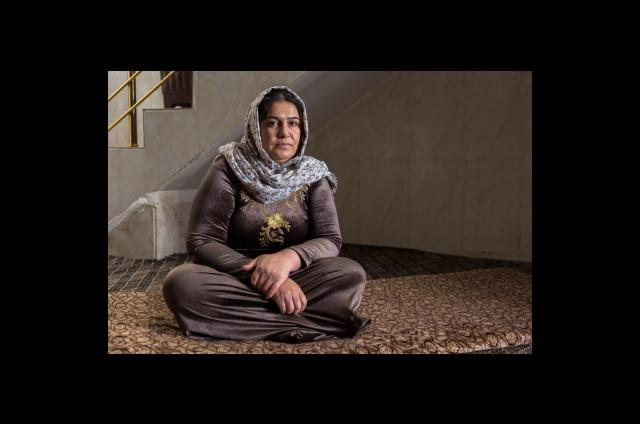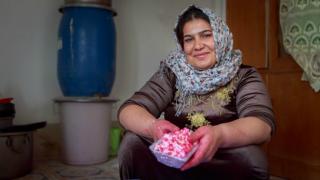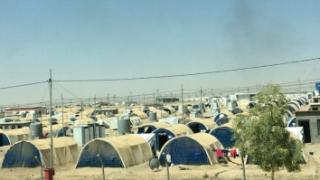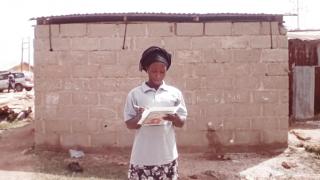The Sinjar Massacre: Four Years On
Four years ago this week, in August 2014, the Sinjar region in northern Iraq was overrun as tens of thousands of Yezidi men, women, and children were forced to flee from the impending Daesh – the so-called Islamic State – who viewed the religious minority community as heretics: dangerous and disposable.
The women were raped. The children were abducted. The men were killed. Amidst the chaos, some managed to escape. They travelled on foot, carrying only the most essential possessions – water, maybe a change of clothes.
Over 180,000 displaced Yezidi people were forced to seek shelter in refugee camps in the Kurdistan Region of Iraq (KRI). There, they joined thousands of Syrian refugees and Iraqi displaced people, all fleeing violence and conflict in the region.
In response to this overwhelming need, Women for Women International appealed to our generous supporters for funds to start supporting women who needed our help in Iraq. Thanks to you, we were able to start working immediately with partner organisations offering social empowerment, skills training and vital psycho-social support to women who experienced trauma.
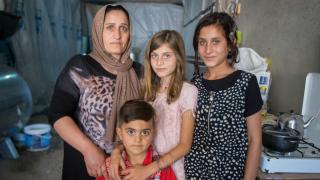
In 2016, whilst visiting Women for Women International partner organisations in the KRI, I met some of the Yezidi women who escaped the Sinjar massacre. Seve, a mother of six, told me about the night she escaped.
“In Sinjar it was very frightening. I witnessed girls as young as 10 being raped by Daesh (ISIS). We were asleep one night, when a neighbour knocked on the door and asked, ‘Why are you not escaping?’ She told us that Daesh (ISIS) had arrived and were kidnapping girls and killing men, so we decided to run away and not take anything with us. We escaped with no shoes, nothing.”
Seve and her family arrived with nothing in Khanke, a town in KRI. At first they lived in a small garage, and Seve’s 12-year old son was forced to work and earn money for the family.
After Seve joined training provided by Women for Women International, she was able to set up a business growing and selling vegetables.
Seve’s story has stayed with me ever since I met her – her courage in helping her family to escape a situation I cannot begin to imagine, her determination to make a success of her business and most of all her hope for the future. Her hope is one I think you will recognise.
I want my daughters to be safe, successful, to go to university and have a career.
To mark the four-year anniversary of the genocide perpetrated against the Yezidi in Sinjar, Laurie Adams, CEO of Women for Women International, will be joining with our partner the Free Yezidi Foundation at a memorial event taking place at the White House. Together they will call on the international community to redouble efforts to provide humanitarian assistance to this vulnerable minority community.
Women for Women International has made a long-term commitment to support women like Seve, who have taken refuge in the Kurdistan Region of Iraq.
I am proud to say, with your support, Women for Women International was able to open an office in Erbil in 2017, so that alongside supporting local partners we have been able to offer our year-long training programme to 300 women this year. But we want to do more – we need to do more.
Looking to the future
The UNHCR estimates that over 1.5 million people have taken refuge in the Kurdistan Region of Iraq. 1 in 4 people living there are either a refugee or internally displaced from elsewhere in Iraq. Many of the people living in KRI have been displaced for years with little prospect of returning ‘home’ in the near future.
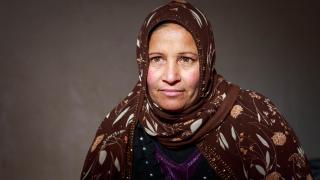
Displaced for months or years, women face challenges that threaten their basic security, economic well-being, and survival. They are targets of sexual harassment and gender-based violence in their families, camps, and host communities. They struggle to earn money to support their families. Many say they are hungry. The realities and experiences of displaced women are made more difficult by living in exile from all that is familiar to them.
The situation might seem hopeless, but we have identified a chance to bring about real change and increase women’s empowerment. Recent research we carried out with the London School of Economics shows that the difficult situation faced by families displaced by conflict can provide a window of opportunity to significantly change attitudes towards women’s role in the family.
Women like Najma, who enrolled on our programme last year, are taking on a role as bread-winner for their family. This is bringing about a positive change in perceptions of women’s economic role within a very traditional society.
We urgently need more funding to expand our work in Iraq and reach more women with our year-long training programme. With your support, we can bring about transformative change for women like Seve and Najma.
Continue reading
Keeping the Window Open
subtitle:
The harsh conditions of conflict and displacement in the KRI have forced families and communities to allow women to engage in economic activities. This necessity can be a window of opportunity.
Katie shares her experience in Erbil, Kurdistan Region of Iraq.
Finding Hope
subtitle:
"I saw my husband dying. It was very painful to watch," shares Rose. She has lost her husband, her community, and her home to violent conflict, but nothing can stop Rose from rebuilding her life.

